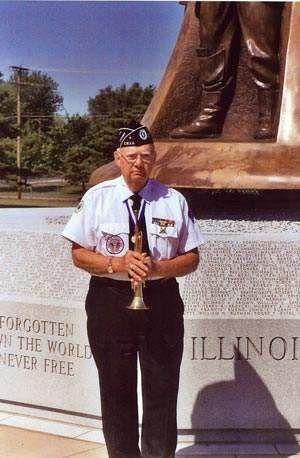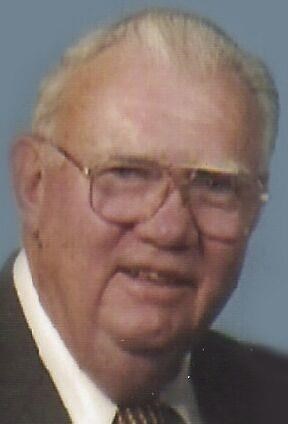Korean War's Ceasefire Bugler
By Joseph Newkirk

As United Nations representatives and leaders from North Korea signed a ceasefire agreement to end the Korean War on July 27, 1953, a lone bugler played taps at 2400 hours (midnight) at the UN Truce Camp in Panmunjom, Korea. United States Marine Sgt. Bob Ericson, a native of Quincy, became known forever after as the war's "ceasefire bugler."
 Ericson had been playing the bugle since age 11 when he joined the Drum and Bugle Corps of Quincy's American Legion Post 37. This fortuitous association placed him among young men of the nation's best-drilled Corps. In 1946, the Quincy Corps, with young Ericson on the bugle, won the national championship in San Francisco.
Ericson had been playing the bugle since age 11 when he joined the Drum and Bugle Corps of Quincy's American Legion Post 37. This fortuitous association placed him among young men of the nation's best-drilled Corps. In 1946, the Quincy Corps, with young Ericson on the bugle, won the national championship in San Francisco.
A year earlier, during a workforce shortage caused by World War II, Ericson had detasselled corn alongside German POWs held at Camp Ellis near Macomb. After joining the Marines in 1950 and completing basic training at Camp Lejeune, N.C., the Corps named him 1st Service Battalion Bugler of the 1st Marine Division. The war in Korea loomed over the horizon.
In 1948, Korea had been divided at the 38th parallel with a communist government in the north and the People's Republic in the south. On June 25, 1950, North Korea invaded its southern neighbor, and President Harry Truman, without waiting for congressional approval, deployed American troops.
Fought by U. S. and UN Forces to stop the spread of communism in Southeast Asia, the war cost 5 million military and civilian lives, with about 40,000 Americans killed and 100,000 wounded. The war ended in a stalemate, and Korea remains divided to this day. Peace negotiations began soon after the war started in 1951, but politics as mean and vicious as the fighting held them up for two years.
In a 2010 interview, Ericson reflected on this dismal interlude: "Negotiations took place in a tent and were made difficult by the Koreans, who cut legs off the chairs to sit taller than UN representatives. They also cut the bases off the American flags. During this two-year charade, most of the causalities and fatalities of the war took place. South Korean President Syngman Rhee tried to destroy the ceasefire by releasing 20,000 North Korean POWs, but they were so tired of war they disappeared into the population rather than fight."
After officials signed the truce, an exchange of sick and wounded prisoners took place with the Koreans. The Marines assigned Ericson to Freedom Village - where doctors and nurses received weakened soldiers - and there, he played daily bugle calls for the camp.
Governments around the world remembered and honored Sgt. Ericson's efforts. In 1985, President Reagan appointed him to the commission, which was to design, build and dedicate the National Korean War Memorial on the Mall in Washington, D. C. He was named the official bugler at the dedication ceremony. Ericson and his wife, Gladys, with a contingent of 20 local Korean War veterans, took a train to Washington for the ceremony, where about 200,000 veterans had gathered. During the practice session for the program, a spotlight shone on Ericson as he played taps and then held the last note until fading into the orchestra's rendition of "America the Beautiful." He gradually muted his bugle and waited for the song to begin, but as he looked down for a cue from the orchestra, the musicians gave him a standing ovation.
In 2003, the Korean government invited Ericson to play at the 50th anniversary of the war's ceasefire. During this time, the Norwegian Embassy learned about the "ceasefire bugler" and invited him to play in that country. In Norway, after a limousine ride to the Norwegian War Memorial courtesy of the government, a national magazine featured his performance and a half-page photograph.
Ericson also played his bugle at the Tomb of the Unknown Soldier at Arlington National Cemetery in Washington, the dedication of the Illinois Korean War Memorial at Oak Ridge Cemetery in Springfield, the Korean War Memorial at the Illinois Veterans Home in Quincy, the burial of the last known Civil War veteran in Memphis, Mo., and several international memorial programs. He became director of the same Quincy American Legion Drum and Bugle Corps he had played in as a youth and served as an officer in the Marine Corps League and the Korean War Veterans.
 Robert "Bob" Ericson was born on August 22, 1930, and except for three years in the USMC, he lived in Quincy his entire life. His father was a World War I veteran who later became a postal worker. In 1948, Ericson married Gladys Holtschlag and, after his discharge on January 4, 1954, accepted a job offer from his father-in-law, the owner of Holtschlag Florist. For the first eight years of his 35-year career, he worked in the greenhouse as a grower, learning this trade on the job and by using the G.I. Bill for specialized horticultural training. He then became a floral designer, and in 1969 the National FTD named him Designer of the Year.
Robert "Bob" Ericson was born on August 22, 1930, and except for three years in the USMC, he lived in Quincy his entire life. His father was a World War I veteran who later became a postal worker. In 1948, Ericson married Gladys Holtschlag and, after his discharge on January 4, 1954, accepted a job offer from his father-in-law, the owner of Holtschlag Florist. For the first eight years of his 35-year career, he worked in the greenhouse as a grower, learning this trade on the job and by using the G.I. Bill for specialized horticultural training. He then became a floral designer, and in 1969 the National FTD named him Designer of the Year.
After contracting rheumatoid arthritis, Ericson reached a point in 1989 when he could no longer stand for long periods of time and accepted a job as the first Veterans Service Officer for the Illinois Disabled Veterans of America at the Illinois Veterans Home in Quincy. In that position, he helped former servicemen and women receive benefits and medical aid and directed them to VA programs and agencies.
Ericson lived at the Veterans Home himself until his death on July 13, 2021. He had come full circle: his first public bugle performance took place in the Home's Lippincott Hall on Armistice Day (now Veterans Day) of 1941, twenty-six days before the Japanese attack on Pearl Harbor that began U. S. involvement in World War II.
Ericson's most poignant performances, though, were perhaps private. He played taps for 69 years at nearly 7,000 funerals of American military veterans who solemnly entered the hereafter on the notes of a lone Marine bugler bestowing a final elegy from a grateful nation.
Bob Ericson passed away on July 13, 2021. His obituary stated, "Burial: Calvary Cemetery, Quincy, Illinois with full military honors by American Legion Post 37 and the United States Marine Corps Funeral Honors Detail.
Being a life-long florist, Bob would appreciate floral tributes. Memorial may be made to the Illinois Veterans Home Activities Fund or Camp Callahan. "